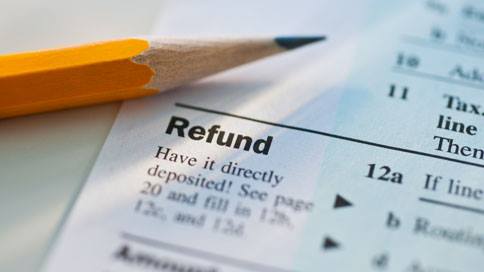Tax season is followed in Canada typically by “tax refund waiting season” with the average Canadian awaiting a tax refund of approximately $1,600. For many waiting on a tax refund it’s seen as a windfall or found money but in reality it means tax has been overpaid and money has been lent to the government on an interest free basis. This is the reverse of the argument I often use when I have to tell people they owe money trying to convince them that it’s a good thing because it means that they borrowed from the government on an interest free basis. As you can imagine this argument only makes them feel marginally better.
So really, the 1st thing to do with your refund is to try NOT to treat it like winning the lottery or a windfall because it’s hard earned money that you worked for. That’s why it would be nice to use it productively and wisely. Here are 10 suggestions for utilizing your tax refund in a wise way:
- Get some disability and/or life insurance. If you are lacking basic insurance coverage for life or disability look at reducing the financial risk to you or your family by finally getting around to this item on your to do list. Like right now. (Call me) Dying or losing the ability to work can cause serious financial hardship to your family’s future. Retirement can be many years away but a death or disability can happen at any time.
- Pay down debt.Pay bad debt first which is not your mortgage but debt incurred usually for personal consumption that is typically higher than your mortgage rate of interest and not deductible. Top of the list: credit card debt. Paying down any kind of debt that has an interest rate attached provides a guaranteed, after-tax, rate of return equal to that interest rate you are paying on such debt. Making an extra payment on your mortgage or other debt will save you over the long term.
- Contribute to your RRSP. If you haven’t set aside enough money for retirement you probably have ample room to make an RRSP contribution which will result in additional tax savings for the deduction you’ll claim next year or in the future.
- Establish an emergency fund/Contribute to your TFSA. If you don’t yet have one, open a TFSA for the tax savings and for the availability of an emergency fund you may need at any moment because “stuff happens”.
- Contribute to your child’s RESP. Putting aside money for the education of a child or grandchild can make you feel good and generate extra money inside the RESP in the form of a Canada Education Savings Grants (CESGs) from the government. Contributing $2,500 annually to an RESP will attract the maximum in CESG and go a long way to helping fund post-secondary education.
- Open up an RDSP for a family member with a long term disability. Similar to an RESP but different, a Registered Disability Savings Plan helps individuals who are eligible for the disability tax credit secure their longer term financial future with the help of government matched grants as well as bonds. Free Money and tax sheltered savings without impacting other social programs like ODSP are all good reasons to look at this option for a loved one with a disability,
- Donate to a worthwhile charity. Using some of your tax refund for a good cause can help make a difference and give you an additional tax deduction. Win/Win.
- Lend some of that refund to a lower income spouse for investing. If you charge the prescribed rate of interest on the loan (currently 1% which can be locked in until the loan is paid back); then all income earned by your spouse will be taxable in his or her hands. Income splitting can make a difference long term to your family net worth.
- GET A WILL. Unless you’re OK with the Province deciding how your assets will be divided instead of you, then spend a few hundred dollars for some peace of mind for you and your family. Life can get really messy without one. Have a conversation and get the documents you need to save your family additional grief. You don’t need to have a lot of wealth for you and your family to benefit from having a Will, Power of Attorney and Guardianships in place. When you have them in place, make sure your loved ones know where to find those documents.
- Invest in yourself. Expand or upgrade your career skills to increase your salary potential long term. A tax refund can make your career prospects brighter if you spend it on acquiring additional skills
If you have covered all of these to do’s off then congrats! Maybe you could spend the money or take a nice vacation because you’ve earned it!







